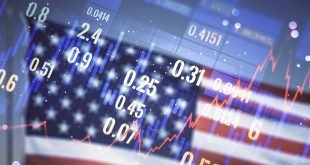Wall Street’s main indexes gained on Wednesday after new data indicated inflation pressures were easing, ahead of the Federal Reserve’s final monetary policy decision of the year, where it is widely expected to leave interest rates unchanged.
The Labour Department’s report showed the Producer Price Index (PPI) for final demand rose 0.9% on an annual basis in November. Economists polled by Reuters had estimated a 1% advance.
On a month-on-month basis, producer prices were unchanged, against an estimated 0.1% increase. The recent slew of reports, including the consumer price index data on Tuesday, have cemented expectations that interest rates have peaked, with traders also estimating potential rate cuts next year.
All eyes are now on the central bank’s interest-rate decision at the end of its two-day meeting, due at 2:00 p.m. ET. Focus will also be on Fed Chair Jerome Powell’s comments after the policy announcement and the release of the “dot plot”, which could provide a glimpse into monetary policy trajectory.
The Fed is expected to shift gradually from a tightening to an easing bias. There would have to be a few meetings in between for Chair Powell to send the message that they are now neutral, and markets haven’t seen that yet.
Money markets have almost fully priced in the Fed holding rates at the current level of 5.25% to 5.50% later in the day. Traders now see a possible monetary easing next year, estimating a nearly 78% chance of at least a 25-basis-point rate cut in May 2024, according to the CME’s FedWatch tool.
The US economy is under threat from geopolitical risks, with the S&P 500 reaching its highest level since January 2022. The increase occurs as the Israel-Gaza conflict heats up and the Russia-Ukraine conflict enters its second year. Wall Street is sceptical of the effects of war on the US economy and is more concerned with the Federal Reserve and inflation rates than with foreign conflict.
Geopolitical uncertainty is the world’s greatest danger, and battles in Ukraine, Israel, and Gaza could have far-reaching consequences for global energy, food supply, trade, and geopolitics.
According to EY’s CEO Outlook Pulse poll, 99% of CEOs are adjusting investments in response to geopolitical challenges. The most significant macroeconomic risk for 2024 is geopolitical bad actors who can upset global economic and market assumptions. Investors are locked in on the Fed, expecting steady interest rates.

 Noor Trends News, Technical Analysis, Educational Tools and Recommendations
Noor Trends News, Technical Analysis, Educational Tools and Recommendations




